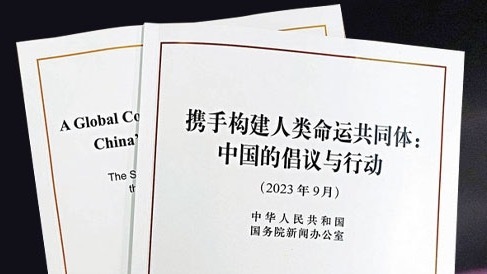China’s Initiatives and Actions in Building a Community with a Shared Future for Mankind
In commemoration of the 10th anniversary of Xi Jinping’s concept of building a community with a shared future for mankind, the Information Office of the State Council of the Communist Party of China released a white paper titled “Working Together to Build a Community with a Shared Future for Mankind: China’s Initiatives and Actions.” The white paper aims to comprehensively introduce the ideological connotation and practical application of this concept, promote understanding and consensus within the international community, and collaborate with other nations to achieve a shared future for all.
However, criticism has arisen regarding the origins of this concept. It is pointed out that the idea of a “community with a shared future” was first proposed by former President Lee Teng-hui of Taiwan in 1992, with a focus on rebuilding Taiwanese identity. Later, Chinese writer Li Yunshi also referenced it in an article titled “Datong Declaration” in 2006. Thus, accusations of plagiarism have been made against Xi Jinping, labeling his adoption of the concept as “plagiarism with Chinese characteristics.”
Moreover, the white paper has been accused of being a propaganda tool rather than an informative document. Critics argue that it is full of falsehoods and serves the purpose of flattery towards Xi Jinping and building momentum for the upcoming “Belt and Road Summit.” They claim that the white paper’s claims of a “bright future” and the notion that the concept transcends time and space are baseless and misleading.
In addition, China’s human rights record has been raised as a point against the country’s ability to lead in building a community with a shared future for mankind. Reports from organizations such as the Human Rights Measurement Initiative have ranked China’s human rights record poorly, citing issues such as indiscriminate arrest and limited freedom. Critics argue that a country with such a record is not qualified to provide answers or lead the international community in finding a way forward for mankind.
Furthermore, concerns have been raised regarding China’s alleged hegemonic behavior. The white paper highlights the “One Belt, One Road” initiative as a significant aspect of building a community with a shared future for mankind. Critics argue that the initiative involves China providing high-interest loans to developing countries, and then Chinese companies taking over infrastructure construction projects, often leaving them unfinished or economically unviable. The result is a burden of debt for the recipient countries. This has led to doubts about China’s intentions and whether it truly seeks to create a shared future or serve its own interests.
Moreover, recent events, such as the imprisonment of Uyghur scholar Rahile Dawut and the sentencing of Uyghur economist Ilham Tohti, have been highlighted to challenge the white paper’s claims of promoting harmony and inclusiveness. These cases, along with the imprisonment of human rights activists and independent journalists, undermine the narrative of a harmonious and inclusive future.
In conclusion, while China presents its white paper on building a community with a shared future for mankind, criticisms regarding the origins of the concept and the country’s human rights record weaken its credibility. Concerns about China’s alleged hegemonic behavior and the imprisonment of activists further erode the narrative of a united and inclusive community. The white paper, which was intended to showcase China’s initiatives and actions, has instead faced accusations of propaganda and deception.
